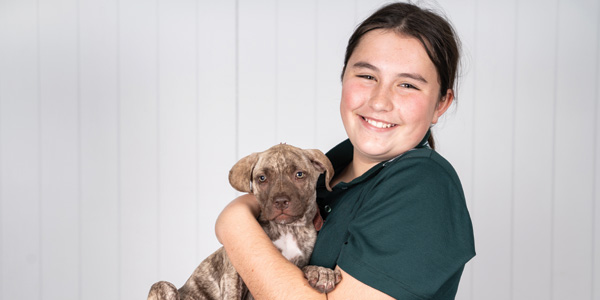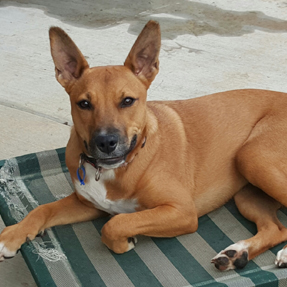RSPCA Queensland have a range of educational programs to enable students to effect change, build empathy and enrich the lives of shelter animals. We are committed to building a more compassionate future one child at a time.
Partners in Animal Welfare (PAW)
The Partners in Animal Welfare School Program aims to educate students, and through them, families and friends, about key issues related to companion animal care, humane consumerism, animals in the environment and RSPCA campaigns. Individual classes or schools can register to become a PAW class or school.
To become a PAW class or school, a number of commitments are required to be completed throughout the year.
Commitments
Gold Status
- Fundraiser - School involvement in recognised fundraising days: Million Paws Walk, Cupcake Day (I am for animals)
- Complete a fundraising activity (dress up as your favourite animal, sponsored sport challenge, read-a-thon, etc)
- AWARE being used in the classroom
- Education visit/or tour (including virtually)
- Make enrichment items for shelter animals/outreach animals, e.g. snuffle mats, rope toys, etc.
- Appoint a School Ambassador
- Students complete Help Them Home program
- Arrange a donation drive for community outreach or shelter animals (i.e. toys, leads, etc)
Silver Status
- One member of staff registered for AWARE
- Canteen providing humane choices in the available food on offer
- Recommended environmental practices followed, e.g. native/food trees planted, habitat enhancement, biodiversity
- Recycling program to reduce plastics flowing to our waterways
- Procedures in place for stray dogs entering the school precinct
- Procedures in place for nesting/breeding wildlife in the school precinct, including but not limited to: mammals including koalas, birds including plovers and magpies, and reptiles including skinks bluetongues and snakes
- Safety issues with animals (risk assessment for SNAKE)
- Following recognised ethical dealing of animals at schools by application and adherence to the state government Animals in Schools and Queensland Schools Animal Ethics Committee Policies
- Humane method of pest control (mice, etc) is a focus of the school Integrated Pest Control Program (IPCP)
- Using worms for disposal of organic waste, for example the school's kitchen garden has a worm farm
- Are you going above and beyond for animals? Give example of other environmental or animal initiatives you have developed
- Promote an RSPCA available for adoption animal through newsletter, on social media, etc
FAQs
- How do I become a PAW class? The class will need to complete two commitments from the Gold category and two from the Silver category.
- How do I become a PAW school? A minimum of four classes must register and complete their commitments.
- What is the cost of the program? There is no cost to the program.
- Does RSPCA cover the cost of supplies? No, RSPCA is unable to cover costs associated with commitments. Most commitments can be completed through the use of donated items such as sheets, toilet rolls, etc.
- What happens when the commitments are completed? Once the commitments have been completed, an RSPCA education officer will contact you to make arrangements to have a representative attend to present PAW signage and individual certificates of commitment to each participant. Representatives could be:
- How does my class/school benefit from becoming a PAW? - Signage at schools identifying it as a RSPCA Queensland Partners in Animal Welfare School. Regcognition as, and celebration of, a responsible and caring school
- A Veterinarian
- An Inspector
- A Rescue Officer (animal ambulance)
- Students gaining an altruistic attitude to others
- RSPCA visits to parades and/or individual classes (where representatives are available or by virtual visit)
- Access to other RSPCA Queensland programs and initiatives
Interested in becoming a PAW class or school? Please register your interest online.
Help Them Home
Each year RSPCA Queensland rehomes hundreds of animals. The Help Them Home literacy program provides students with real time opportunities to impact and change the lives of shelter animals. The program connects students to a shelter animal in need of a home and encourages students to write a persuasive adoption profile to potential new owners.
Students will need to consider varying factors about the animal to use persuasive text to motivate the potential adopter to adopt the animal. Students will have the opportunity to meet with an RSPCA educator virtually for a Q&A session prior to being assigned an animal.
FAQs
- What resources will RSPCA provide? Students will have the opportunity to speak with an education officer (virtually) to gain an understanding of why adoption profiles are an important part of the rehoming process. Students will also be given a photo and information about their assigned animal. Students can also access current animals available for adoption on the RSPCA website.
- What happens to the adoption profile when completed? The profile report will be placed on the animal's adoption pen. The profile report may also be placed on the RSPCA website or social media sites to assist the animal to be rehomed.
- Can the students meet their assigned animal? Unfortunately, we are unable to facilitate a meet and greet. This is because the animal may be located at any of our RSPCA shelters, be in foster care or under the care of our veterinary team.
Interested in your students helping to Get Them Home? Please register your interest online.
Reading to Rescues
Reading to Rescues is a literacy support program aimed at improving literacy levels of reluctant readers, or those struggling to maintain an age-appropriate level of literacy. By providing students with the opportunity to read to a dog in a one-on-one setting creates an environment where children feel comfortable to read without the stress and fear associated with speaking in front of peers or teachers.
Students will have the opportunity to impact a shelter animal through engagement and calm interaction, while improving their literacy skills. The silent companionship of reading to a shelter animal enables the student to work through reading challenges at their own pace without fear of judgement, helping to overcome anxiety.
FAQs
- Is the program available at all shelters? Unfortunately, Reading to Rescues is only available at selected Animal Care Centres. Currently our Wacol, Cairns and Toowoomba campuses have capacity to accept new clients. We hope to provide opportunities at other regional shelters across Queensland as resources become available, so please check back soon.
- What days is the program available? The program is available on Mondays and Tuesdays between 10am and 12pm.
- Is there a cost? No, the program is free.
- How many children can attend a session? Each session within the program has a maximum of 8 students. This allows for an appropriate ratio of students to animals, and education support personnel.
- What equipment do we need to bring? The students should bring their reader (book). RSPCA will have some readers on hand, however these will not be levelled. Cushions/bean bags will be provided for the students to sit.
- Are there any pre-requites prior to enrolling students? Each student should have a reading evaluation completed prior to the commencement of the Reading to Rescues program. This is the responsibility of the school, and the result does not need to be shared with RSPCA Queensland. On completion of the program the student should be retested to gauge any improvement.
Interested in your students reading to a rescue? Please register your interest online.









